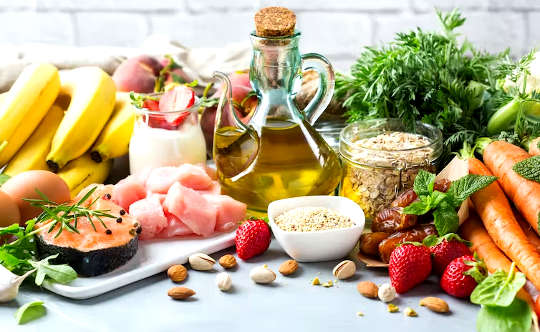
Heart-healthy approaches to eating include the Mediterranean diet, the DASH diet and the Portfolio diet. (Shutterstock)
Your diet — the foods and drinks you eat, not short-term restrictive programs — can impact your heart disease risk. Evidence-based approaches to eating are used by dietitians and physicians to prevent and treat cardiovascular (heart) disease.
National Nutrition Month, with its 2023 theme of Unlock the Potential of Food, is an ideal opportunity to learn more about these approaches and adopt more heart-friendly behaviours.
The Canadian Cardiovascular Society (CCS) Clinical Practice Guidelines recommend three main dietary patterns for lowering heart disease risk: the Mediterranean Diet, Dietary Approaches to Stop Hypertension (DASH) and the Portfolio Diet.
-
The Mediterranean Diet is rich in colourful vegetables and fruits, whole grains, legumes, nuts, olive oil and seafood. Research studies have shown that this diet reduces risk of having a heart attack or stroke, even if you already have heart disease, and provides several other health benefits. Dietitians of Canada has created a resource that summarizes the details of this approach to eating.
Get The Latest By Email
-
The DASH Diet focuses on eating plenty of vegetables, fruit, low-fat dairy, whole grains and nuts, while limiting red and processed meats, foods with added sugar, and sodium. Originally developed to treat high blood pressure, this diet can also lower low-density lipoprotein cholesterol (LDL-C — the unhealthy type of cholesterol) and provides several other health benefits. Heart & Stroke has several resources on this approach to eating.
-
The Portfolio Diet was originally developed in Canada to treat high cholesterol. It emphasises plant proteins (for example, soy and other legumes); nuts; viscous (or “sticky”) fibre sources such as oats, barley and psyllium; plant sterols; and healthy oils like olive oil, canola oil and avocado. Many research studies have shown that this diet can lower LDL-C, and provides several other health benefits. Research shows that even small additions of Portfolio Diet heart-healthy foods can make a difference; the more you consume of these recommended foods, the greater your reductions in LDL-C and heart disease risk. The Canadian Cardiovascular Society has an infographic on how to follow the Portfolio Diet.
A common theme among these three approaches to eating is that they are all considered plant-based, and small changes can make a difference in your overall heart disease risk. “Plant based” does not necessarily mean you have to be 100 per cent vegan or vegetarian to get their benefits. Plant-based diets can range from entirely vegan to diets that include small to moderate amounts of animal products.
Knowledge of healthy eating approaches is key, but behaviours unlock the power of food. Below are three strategies to use to apply the potential of food to promote heart health. They show that by combining the power of nutrition and psychology, you can improve your chances of making long-term changes.
You don’t need to do this alone. We recommend requesting a referral from your physician (this helps with getting the appointment covered by your insurance) to work with a registered dietitian and/or psychologist (behaviourist) to co-create your own ways to unlock the potential of food.
Three ways to unlock the power of food
1. Master and conquer the 90 per cent goal
Pick a goal you’re 90 per cent sure you can succeed at, while creating a plan to meet larger and harder goals in the future. This approach will help you build confidence in your skills and give you valuable information about what does and does not work for you.
Research shows starting with 90 per cent goals makes it more likely we meet future goals. A 90 per cent goal could be swapping out animal protein for plant protein — such as tofu or beans — at lunch on Mondays (Meatless Mondays). Another example: use a meal delivery service that provides measured ingredients with plant-based recipes on Monday, Wednesday and Friday, so you can get some new ideas about how to incorporate more plants into your meals.
2. Why eliminate and restrict, when you can substitute?
Pick a “do instead” goal or work with a registered dietitian to substitute healthier choices for your current foods and drinks. Avoid setting goals that may make you focus MORE on the foods you’re trying to avoid (for example, “stop eating sugar”).
Instead, the substitution approach can include things like choosing lower-sodium soup or purchasing pre-cut vegetables with the aim of reducing your starch portion at meals by half. Canada’s Food Guide, Diabetes Canada and Heart & Stroke recommend that half your plate be vegetables.
3. Set value-based goals
Connect your goal to something that deeply matters to you. While long-term outcomes (such as heart disease) may be the impetus for change, research shows that things that matter to us right now motivate us most. Picking personal and meaningful reasons for change will help with sustained change.
For example, choose to cook one meal that incorporates a vegetable with a close friend or family member, so you can share the experience and spend time together. This example may be rooted in the following values: kindness, relational values, cultural values, empathy, courage.
Unlock the power of food
Research shows a key to changing diet is focusing on changing eating habits and food behaviours, one at a time. The support of a nutrition professional, such as a registered dietitian and/or a psychologist, can help you make informed choices and plans, tailored to your unique needs, situation, preferences, traditions, abilities and capacity.![]()
About The Authors
Shannan M. Grant, Associate Professor, Registered Dietitian, Department of Applied Human Nutrition, Mount Saint Vincent University; Andrea J. Glenn, Postdoctoral research fellow, Department of Nutrition, Harvard T.H. Chan School of Public Health, Harvard University, and Dayna Lee-Baggley, Adjunct professor, Department of Family Medicine & Department of Psychology and Neuroscience, Dalhousie University
This article is republished from The Conversation under a Creative Commons license. Read the original article.
books_nutrition







